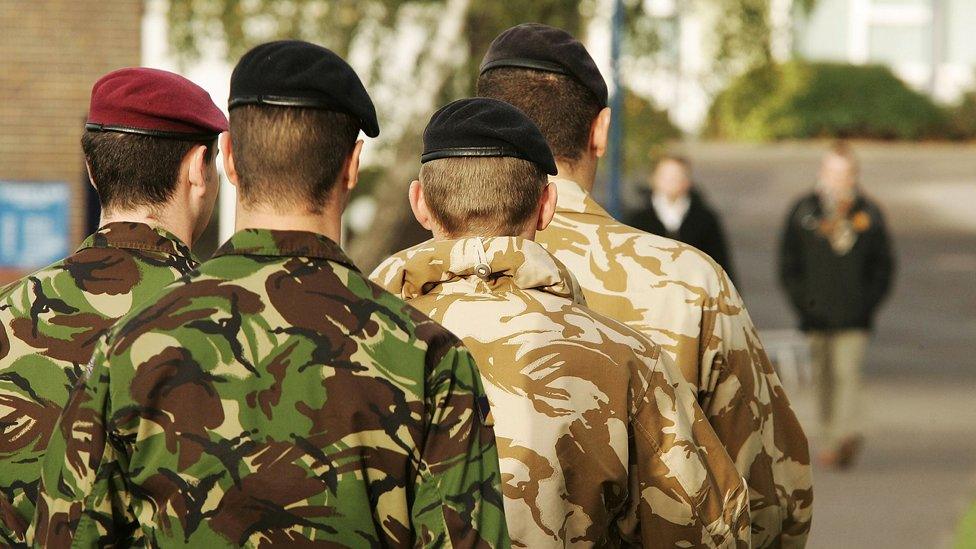Who were the Deepcut four?
- Published
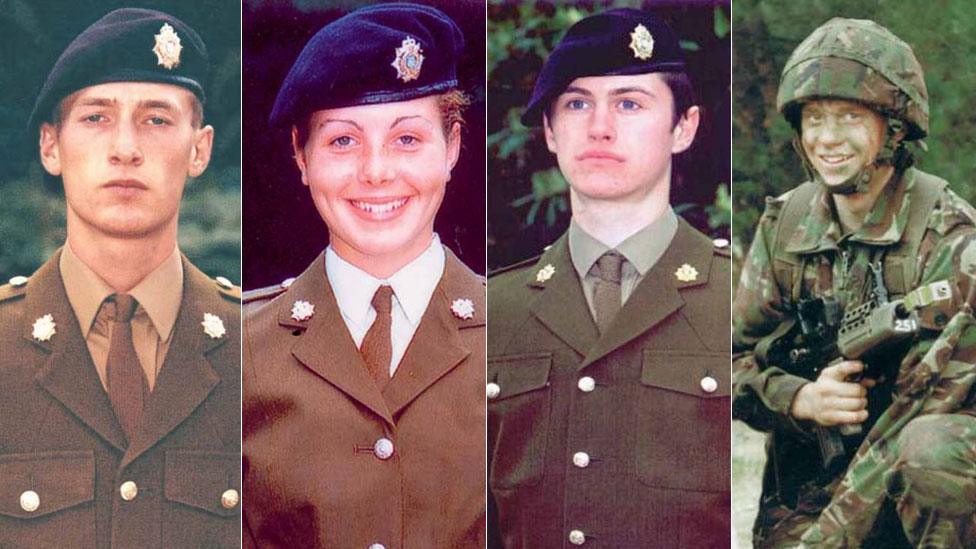
Privates Sean Benton, Cheryl James, Geoff Gray and James Collinson died between 1995 and 2002 at Deepcut barracks
Between 1995 and 2002, four young Army recruits died from gunshot wounds at Deepcut barracks in Surrey.
The Army insisted the deaths were all suicides, but the families disagreed. Initial inquests returned three open verdicts and one of suicide.
Calls for an inquiry came as early as 2002 and a police investigation followed, along with a review of Army training procedures.
But following a leaked police report, allegations of bullying and harassment continued.
What has happened since?
In 2004, the government announced a review by Nicholas Blake QC, external, who concluded the deaths of the so-called Deepcut four were probably self-inflicted.
Independent ballistics expert Frank Swann, who investigated the deaths initially for the police and later the families, had said he thought it was "highly unlikely" many of the fatal bullets were fired by the recruits themselves.
But he did not give evidence to the Blake review, and later came under fire, external amid claims he gave more information to the media than the official investigation.
Since 2016, fresh inquests have been held into the deaths of three of the recruits, while the family of the fourth call for a public inquiry.
Who were the Deepcut four?
Privates Geoff Gray, Cheryl James, Sean Benton and James Collinson all sustained fatal gunshot wounds at Deepcut.
The circumstances surrounding their deaths has been the subject of debate in each case.
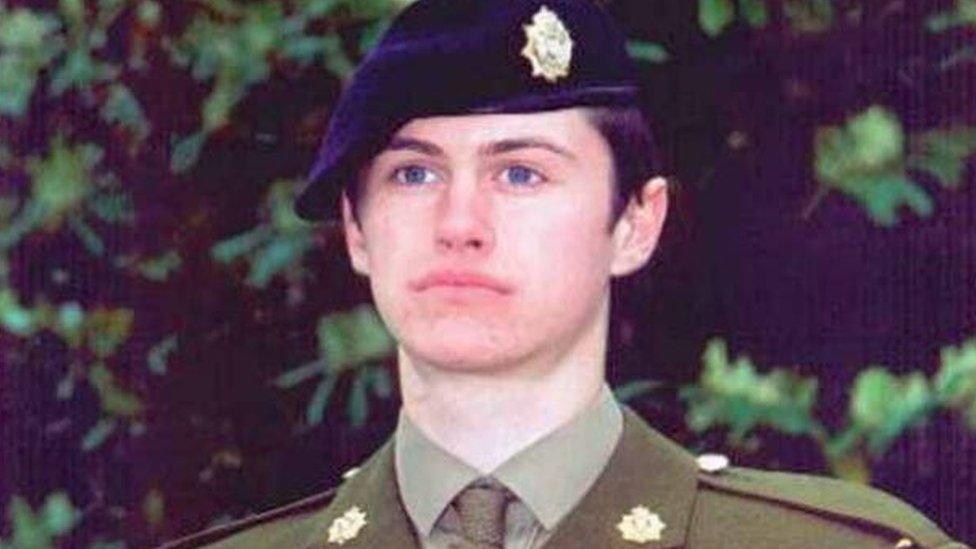
Pte Gray was found with two gunshot wounds to his head while on guard duty in 2001. The Army said he killed himself and the first inquest returned an open verdict.
Some aspects of his death seemed mysterious, including reports that a figure was seen running away from the area and suggestions his body was moved shortly after his death.
Mr Swann said it was "highly unlikely" the 17-year-old from Seaham in Count Durham had killed himself.
His parents, Geoff and Diane, believed he loved being in the Army and did not think he took his own life.
They said: "He had no girl problems, no money worries and, in fact, he could not have been at a better time in his life."
The Grays consistently pushed for a public inquiry into the Deepcut deaths and a new inquest for their son.
Mr Gray said: "There's an awful lot of young soldiers killed in various circumstances and I believe that an awful lot of those soldiers' deaths have not been investigated correctly.
"I think the Army has had a blasé attitude towards young soldiers - you're in the Army, you're nothing but a number, but as soon as you're dead that number is scratched out straight away."
A new hearing began in February at Woking Coroner's Court after the family successfully argued fresh evidence had come to light.
The inquest concluded on Thursday his death was suicide.
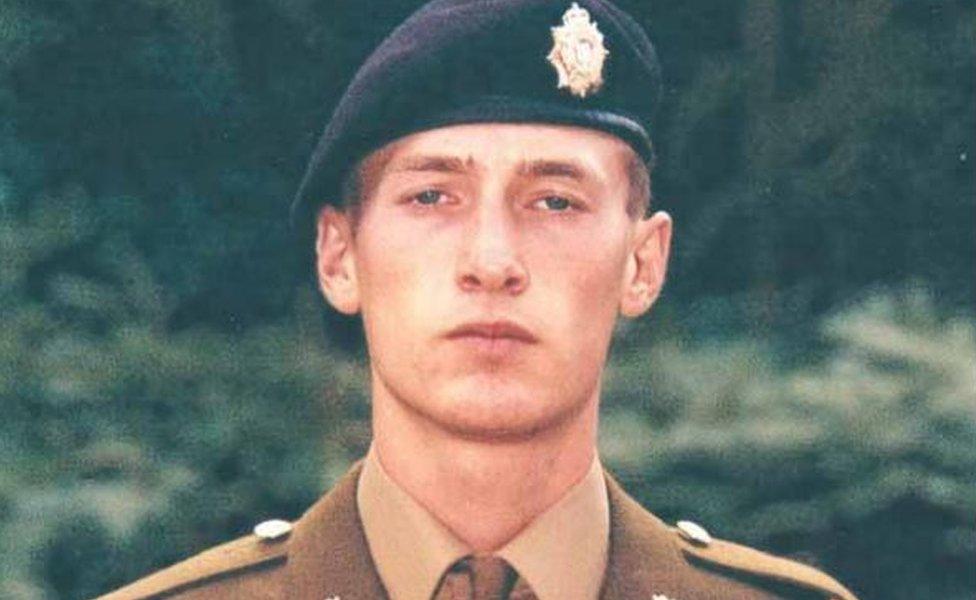
Pte Benton was found with five gunshot wounds in June 1995 while on guard at a perimeter fence.
A BBC Panorama investigation claimed the 20-year-old, from Hastings in East Sussex, was attacked as he slept by a gang wearing gas masks.
On another occasion, the programme said, he was thrown through a window after falling out of favour with a sergeant for answering back.
A friend of Pte Benton, Trevor Hunter, said the recruit had been the target of "vicious verbal attacks and humiliating abuse" which drove him to take his own life.
"He was an easy target because he had a croaky voice, he spoke his mind and his kit was a mess," he said.
The Army said it was suicide and an inquest concurred.
Mr Swann said it was impossible for Pte Benton to have killed himself, suggesting he had been shot four times from a distance and only once from close range.
However, there were two witnesses to Pte Benton's death and both soldiers gave evidence to the Blake review of what they saw happen.
A second inquest was ordered after a campaign by the family for a full investigation amid allegations he suffered prolonged bullying.
It heard from more than 170 witnesses. There were claims the recruit was "constantly punished", assaulted and bullied, and at one stage "shackled", but former barracks staff have said they would have known if there was mistreatment.
At its conclusion in July, Judge Peter Rook QC recorded Pte Benton's death as suicide.
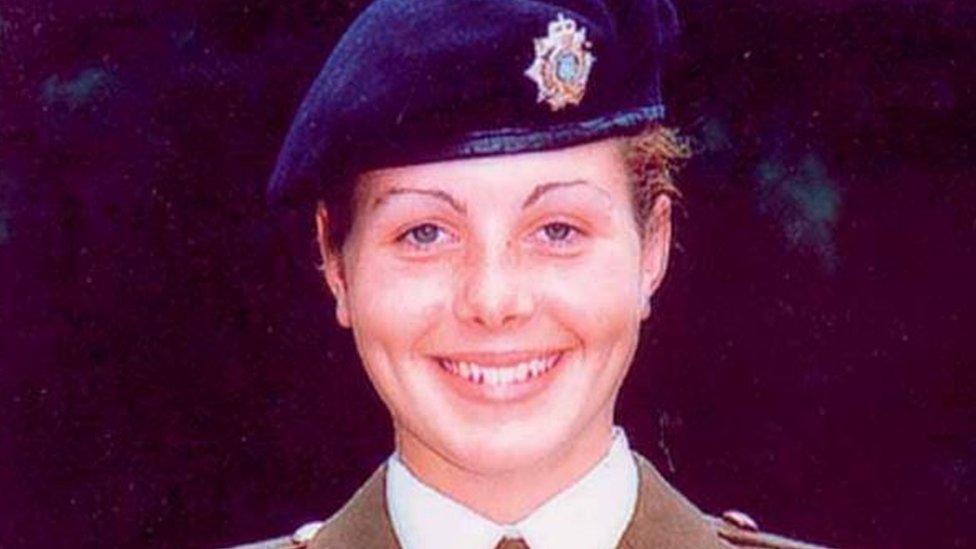
Pte James was found with a bullet through her forehead in woodland outside the barracks, five months after Pte Benton's death.
The Army said her death in November 1995 was suicide but an inquest the following month recorded an open verdict.
That was quashed by the High Court and a second inquest held in 2016, when coroner Brian Barker QC concluded her death was suicide.
He said the wound was "self-inflicted" and the 18-year-old recruit from Llangollen in north Wales had fired the gun intentionally.
Pte James's father, Des James, believed his daughter suffered sexual harassment and violence at Deepcut, and said the family was "deeply saddened" by the conclusions of the inquest.
The coroner agreed there was a "sexualised" atmosphere at the barracks and there were far too few officers to train and look after the young recruits, who were bored and undisciplined.
When he gave his findings, external, Mr Barker praised the Blake review as "meticulous".
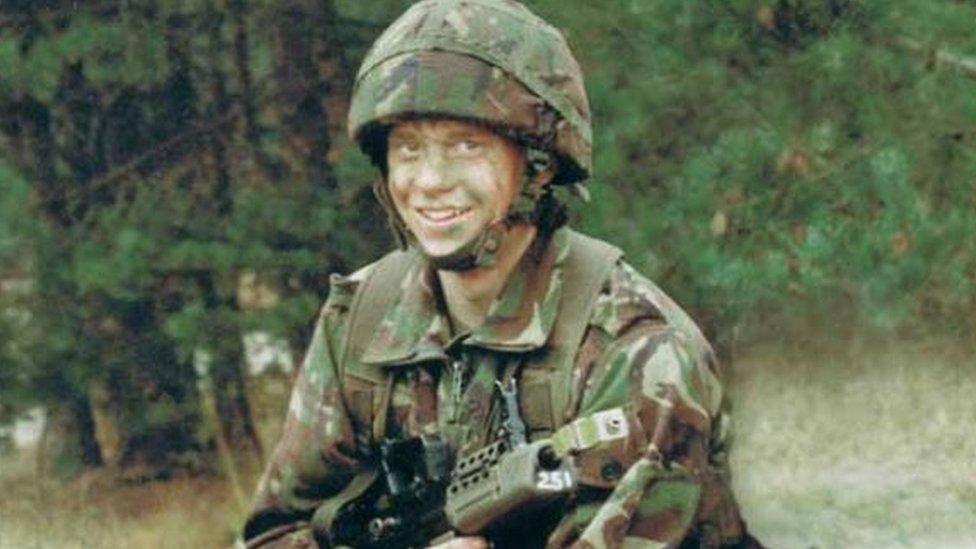
Pte Collinson was found with a single gunshot wound through his chin while on guard duty in March 2002.
Once again, the Army said the 17-year-old from Perth had killed himself but an inquest returned an open verdict.
His parents insisted he was a happy, cheerful young man, full of pride at being a soldier and making plans for his future, and had no reason to take his life.
Mr Swann said it was "unlikely" bullet wounds to the underside of Pte Collinson's chin and head were self-inflicted, but it was possible they were the result of an accident.
Pte Collinson's mother, Yvonne Heath, said: "I don't believe that my son pulled that trigger but at the same [time], I don't believe anyone wished him dead. I think in the regime at Deepcut at the time there was very little supervision. I think some silly prank went terribly wrong."
Over the years, Ms Heath has made calls for a public inquiry into Deepcut. The human rights group Liberty has said it is examining the evidence in Pte Collinson's case.
It said information disclosed to the family by the authorities had far exceeded that which was provided at the original inquest.

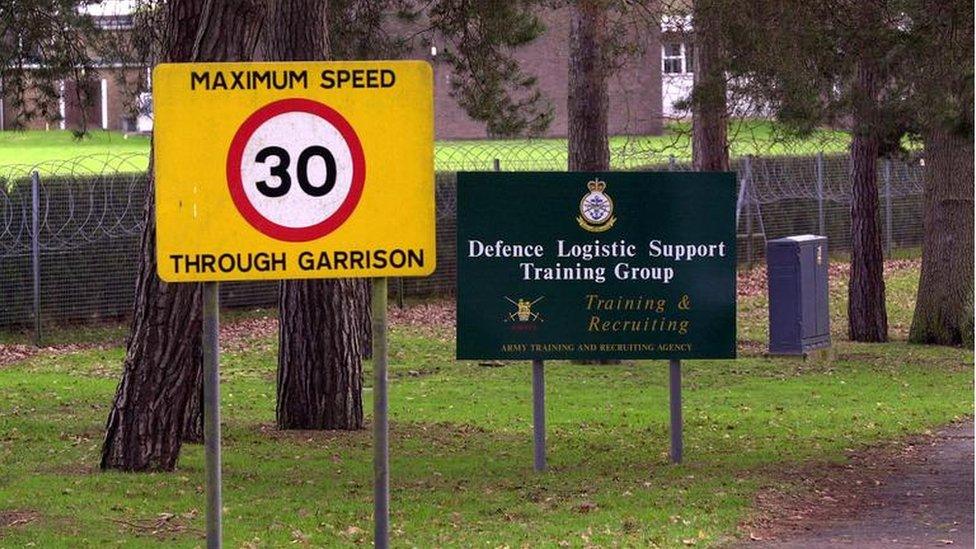
Key dates
April 1993: The Royal Barracks, Deepcut, an Army base since around 1900, becomes the home of the newly formed Royal Logistic Corps, offering training for young soldiers
June 1995: Sean Benton is found dead
The inquest into Pte Benton's death records a verdict of suicide
November 1995: Cheryl James is found dead
December 1995: The inquest into Pte James's death records an open verdict
September 2001: Geoff Gray is found dead
March 2002: The inquest into Pte Gray's death records an open verdict
March 2002: James Collinson is found dead
April 2002: Surrey Police opens a joint investigation into the deaths of Pte Gray and Pte Collinson. The force later confirms it is also reviewing the deaths of Pte James and Pte Benton
June 2002: The families of the four soldiers call for a public inquiry
October 2002: The body of Pte Collinson is exhumed. A forensic pathologist carries out a second post-mortem examination to try to establish how he died
September 2003: Surrey Police concludes there are no grounds for prosecutions over the deaths of the four young soldiers
May 2004: The government rejects calls for a public inquiry into the soldiers' deaths but announces an "independent" inspection regime into armed forces training
October 2004: New allegations of gang rape, systematic bullying and sexual harassment at Deepcut are disclosed in a leaked police report. The government announces a new review of allegations of abuse and bullying at Deepcut but stops short of the full public inquiry demanded by families and MPs. Nicholas Blake QC is later chosen to lead the review
March 2006: The inquest jury looking into the death of Pte Collinson returns an open verdict
March 2006: The Blake Review, external criticises Army training, citing "harassment, discrimination and oppressive behaviour", but concludes that the deaths were probably self-inflicted
May 2009: The government again rejects calls for a public inquiry
March 2011: A review by Devon and Cornwall Police found Surrey Police failed to investigate fully a potential suspect, known as the "unknown white male", in the death of Pte James
January 2012: The family of Pte Collinson renew calls for a public inquiry on the 10-year anniversary of the soldier's death
March 2014: The Attorney General grants Pte James's family consent to apply to the High Court for a new inquest into her death
July 2014: High Court judges order a fresh inquest into the death of Pte James
September 2015: A pre-inquest review hears the body of Pte James was exhumed and reburied the previous month and bullet fragments from the body were undergoing further testing
June 2016: At the end of a second inquest into Pte James's death, coroner Brian Barker QC rules the gunshot wound to her head was self-inflicted and intentional, and her death was suicide
October 2016: A High Court judge rules a fresh inquest can take place into the death of Pte Benton
November 2017: The family of Pte Gray win High Court action for a fresh inquest
July 2018: After a fresh inquest at Woking Coroner's Court, a coroner rules Pte Benton's death was suicide
February 2019: A second inquest begins into the death of Pte Gray
June 2019: A coroner rules Pte Gray's death was suicide
- Published20 June 2019
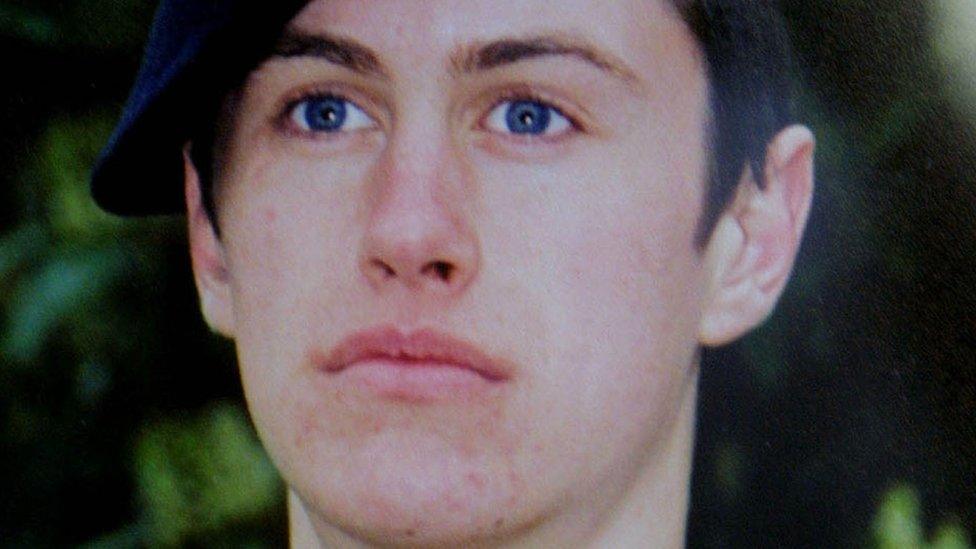
- Published18 July 2018
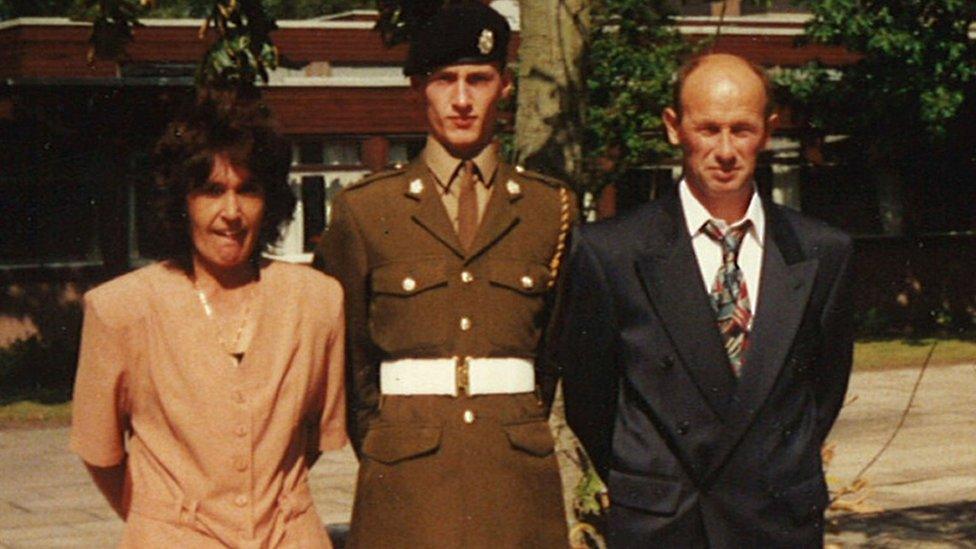
- Published3 June 2016
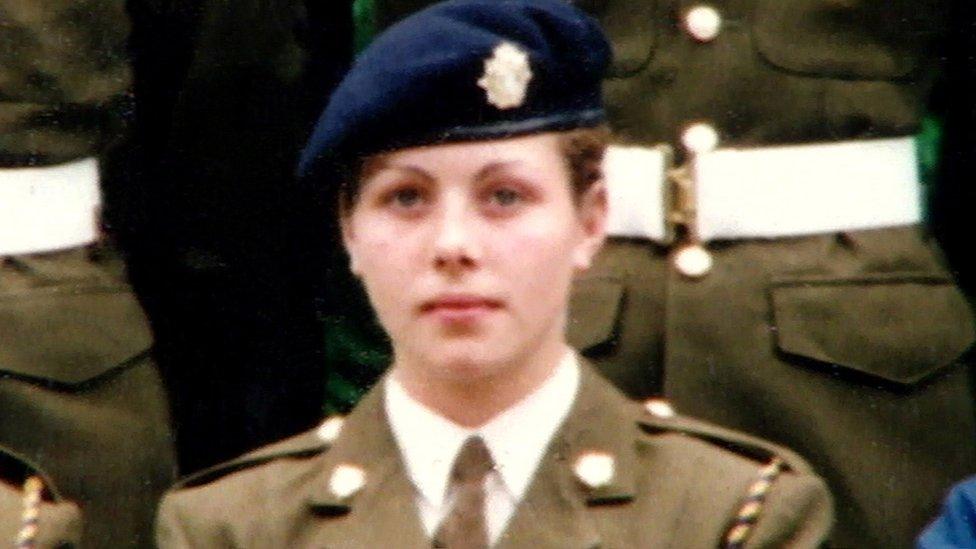
- Published3 June 2016
